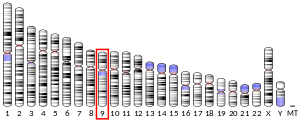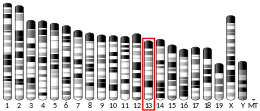SPTLC1
Serine palmitoyltransferase, long chain base subunit 1, also known as SPTLC1, is a protein which in humans is encoded by the SPTLC1 gene.[5][6]
Serine palmitoyltransferase, which consists of two different subunits, is the initial enzyme in sphingolipid biosynthesis. It converts L-serine and palmitoyl CoA to 3-oxosphinganine with pyridoxal 5'-phosphate as a cofactor. The product of this gene is the long chain base subunit 1 of serine palmitoyltransferase. Mutations in this gene were identified in patients with hereditary sensory neuropathy type 1. Alternatively spliced variants encoding different isoforms have been identified.[5]
References
- GRCh38: Ensembl release 89: ENSG00000090054 - Ensembl, May 2017
- GRCm38: Ensembl release 89: ENSMUSG00000021468 - Ensembl, May 2017
- "Human PubMed Reference:". National Center for Biotechnology Information, U.S. National Library of Medicine.
- "Mouse PubMed Reference:". National Center for Biotechnology Information, U.S. National Library of Medicine.
- "Entrez Gene: SPTLC1 serine palmitoyltransferase, long chain base subunit 1".
- Weiss B, Stoffel W (October 1997). "Human and murine serine-palmitoyl-CoA transferase--cloning, expression and characterization of the key enzyme in sphingolipid synthesis". Eur. J. Biochem. 249 (1): 239–47. doi:10.1111/j.1432-1033.1997.00239.x. PMID 9363775.
Further reading
- Weiss B, Stoffel W (1997). "Human and murine serine-palmitoyl-CoA transferase--cloning, expression and characterization of the key enzyme in sphingolipid synthesis". Eur. J. Biochem. 249 (1): 239–47. doi:10.1111/j.1432-1033.1997.00239.x. PMID 9363775.
- Gable K, Slife H, Bacikova D, et al. (2000). "Tsc3p is an 80-amino acid protein associated with serine palmitoyltransferase and required for optimal enzyme activity". J. Biol. Chem. 275 (11): 7597–603. doi:10.1074/jbc.275.11.7597. PMID 10713067.
- Hanada K, Hara T, Nishijima M (2000). "Purification of the serine palmitoyltransferase complex responsible for sphingoid base synthesis by using affinity peptide chromatography techniques". J. Biol. Chem. 275 (12): 8409–15. doi:10.1074/jbc.275.12.8409. PMID 10722674.
- Perry DK, Carton J, Shah AK, et al. (2000). "Serine palmitoyltransferase regulates de novo ceramide generation during etoposide-induced apoptosis". J. Biol. Chem. 275 (12): 9078–84. doi:10.1074/jbc.275.12.9078. PMID 10722759.
- Bejaoui K, Wu C, Scheffler MD, et al. (2001). "SPTLC1 is mutated in hereditary sensory neuropathy, type 1". Nat. Genet. 27 (3): 261–2. doi:10.1038/85817. PMID 11242106.
- Dawkins JL, Hulme DJ, Brahmbhatt SB, et al. (2001). "Mutations in SPTLC1, encoding serine palmitoyltransferase, long chain base subunit-1, cause hereditary sensory neuropathy type I.". Nat. Genet. 27 (3): 309–12. doi:10.1038/85879. PMID 11242114.
- Nicholson GA, Dawkins JL, Blair IP, et al. (2001). "Hereditary sensory neuropathy type I: haplotype analysis shows founders in southern England and Europe". Am. J. Hum. Genet. 69 (3): 655–9. doi:10.1086/323252. PMC 1235494. PMID 11479835.
- Stachowitz S, Alessandrini F, Abeck D, et al. (2003). "Permeability barrier disruption increases the level of serine palmitoyltransferase in human epidermis". J. Invest. Dermatol. 119 (5): 1048–52. doi:10.1046/j.1523-1747.2002.19524.x. PMID 12445191.
- Strausberg RL, Feingold EA, Grouse LH, et al. (2003). "Generation and initial analysis of more than 15,000 full-length human and mouse cDNA sequences". Proc. Natl. Acad. Sci. U.S.A. 99 (26): 16899–903. doi:10.1073/pnas.242603899. PMC 139241. PMID 12477932.
- CAMPBELL AM, HOFFMAN HL (1996). "Sensory Radicular Neuropathy Associated with Muscle Wasting in Two Cases". Brain. 87: 67–74. doi:10.1093/brain/87.1.67. PMID 14152213.
- Verhoeven K, Coen K, De Vriendt E, et al. (2004). "SPTLC1 mutation in twin sisters with hereditary sensory neuropathy type I.". Neurology. 62 (6): 1001–2. doi:10.1212/01.wnl.0000115388.10828.5c. PMID 15037712.
- Humphray SJ, Oliver K, Hunt AR, et al. (2004). "DNA sequence and analysis of human chromosome 9". Nature. 429 (6990): 369–74. doi:10.1038/nature02465. PMC 2734081. PMID 15164053.
- Dedov VN, Dedova IV, Nicholson GA (2006). "Hypoxia causes aggregation of serine palmitoyltransferase followed by non-apoptotic death of human lymphocytes". Cell Cycle. 3 (10): 1271–7. doi:10.4161/cc.3.10.1163. PMID 15467453.
- Rual JF, Venkatesan K, Hao T, et al. (2005). "Towards a proteome-scale map of the human protein-protein interaction network". Nature. 437 (7062): 1173–8. doi:10.1038/nature04209. PMID 16189514.
- McCampbell A, Truong D, Broom DC, et al. (2006). "Mutant SPTLC1 dominantly inhibits serine palmitoyltransferase activity in vivo and confers an age-dependent neuropathy". Hum. Mol. Genet. 14 (22): 3507–21. doi:10.1093/hmg/ddi380. PMID 16210380.
- Chen M, Han G, Dietrich CR, et al. (2007). "The essential nature of sphingolipids in plants as revealed by the functional identification and characterization of the Arabidopsis LCB1 subunit of serine palmitoyltransferase". Plant Cell. 18 (12): 3576–93. doi:10.1105/tpc.105.040774. PMC 1785403. PMID 17194770.
- Hornemann T, Wei Y, von Eckardstein A (2007). "Is the mammalian serine palmitoyltransferase a high-molecular-mass complex?". Biochem. J. 405 (1): 157–64. doi:10.1042/BJ20070025. PMC 1925250. PMID 17331073.
- Ewing RM, Chu P, Elisma F, et al. (2007). "Large-scale mapping of human protein-protein interactions by mass spectrometry". Mol. Syst. Biol. 3 (1): 89. doi:10.1038/msb4100134. PMC 1847948. PMID 17353931.
This article is issued from Wikipedia. The text is licensed under Creative Commons - Attribution - Sharealike. Additional terms may apply for the media files.



